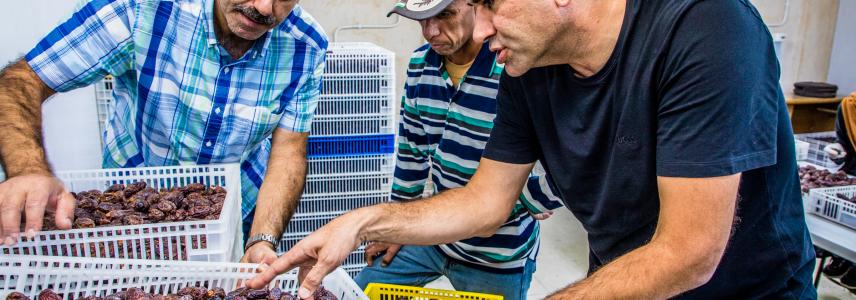Dates with destiny: CBI helps Jordanian date farmers to grow, with new market opportunities

"We never planted a palm tree in our life,” exclaims Omar Khalifeh, grinning, as he tells us the short history of the date farm he runs with his brother Mohammed. The land in the Jordan Valley belonged to his family long before he was born. He and his brother are both agricultural engineers, so they weren’t exactly novices when it came to cultivating vegetables or fruits.
Opportunity knocks
“In the past, dates were popular in Jordan, but at some point, they disappeared from the menu, and we only ate imported dates from Tunisia during Ramadan. Ten years ago, Medjool dates became a trend, which we noticed. We saw an opportunity, and in 2012 we planted our first plot.” Mohammed is the agricultural expert, and Omar is responsible for the commercial side of the business. “We brought in professionals to help us grow the dates because growing date palms requires specific knowledge. In Jordan, there are two suppliers of the tissue culture seedlings, that are necessary to grow premium quality Medjool dates. We learned to grow the palms through trial and error and were assisted by the suppliers of fertilizers and pesticides. In 2014, we planted three additional plots, so nowadays we own 50 acres of dates.”
Growing dates also requires patience: it takes five years before the trees bear fruit. Omar and his brother used the time wisely, to establish the farm. They built a processing unit out of two sea containers and covered the space in between. They turned the containers into cooling units, and a team of local women sorts the dates in between. Even after expanding the warehouse and cooling capacity, the original layout is still functioning, as part of a new and improved building.
Lengthy process
“Growing palms is one of the most difficult agricultural processes. It takes a lot of work year-round: we need to prune the trees, thin the bunches, put the dates in a mesh bag to protect them, harvest the fruits over one month and after that clean the plants. Eleven- to twelve Egyptian workers are permanently employed to care for the palm trees. After harvesting, we hire twenty- to thirty women to sort the dates according to quality and grade. While we were struggling to get it all right, a friend told me about the CBI program.”
“We attended all training sessions, and it enlightened us. We are agricultural engineers, and while we consider ourselves professionals, we learned something new every day. We were already exporting dates to Arabic countries, but the program helped prepare us for the Global GAP certification. It was like going to university. As part of the program, we visited Berlin Fruit Logistica, where we learned a lot about the packaging requirements for export to Europe.”

Business and social improvements
“In the beginning, we were a little hesitant about Global GAP and the requirements, but we enjoyed being committed to gain the certification. We reorganized the farm, the accounts and the workers. For example, we had never visited the housing facilities of the workers before, and we were disappointed by the conditions in their kitchen. We improved the kitchen and bathrooms. My brother said that taking better care of the workers was the best thing that we did. All in all, the farm is cleaner now, and we are much more organized.”
Ayla is by no means the only date grower and exporter in Jordan. “There were seven date growers in the program. Before we were not that close. Now we are doing business together. When one colleague is short of dates, we sell them part of our stock. One of the farmers imports the mesh bags that protect the fruits in the trees and sells it to the others. There’s a continuous demand for Medjool dates, so it’s best to work together.”
Selling vegetables in this unstable region, bordering Syria, Iraq and Israel, has become very challenging and fraught with danger. The dates provide a profitable alternative and exporting them to Europe relieves the Jordanian farmers of the logistical challenges around getting produce to market within the region.